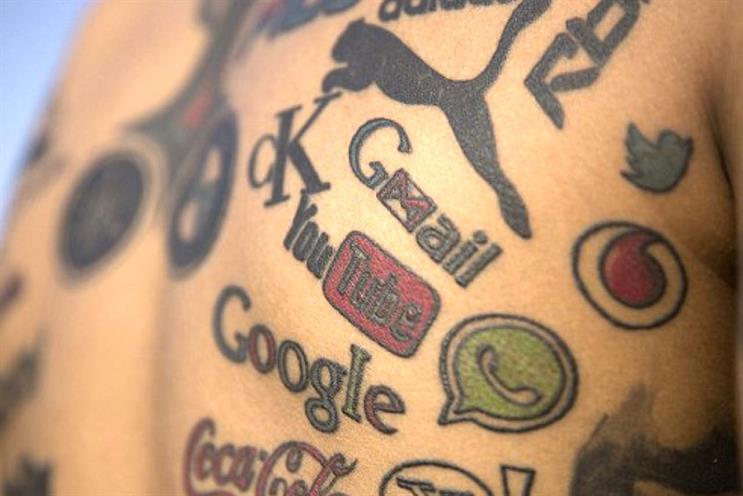Going back to the origins of human kind, early forms of body painting or tattooing were about expressing allegiance or denoting a position within a tribe.
More recently, the military institutionalised this behaviour by having soldiers and officers visually express their rank and belonging through an organised system of colours, shapes and materials.
But it doesn’t stop at sailors with anchor tattoos. Doctors too are part of a dedicated team, reflected perhaps not through tattoos, but their white coats.
Their lifestyle is carried through their uniforms. These uniforms, be it a nurse’s tunic, a hotel clerk’s pressed blazer, or the full dress of a decorated naval officer, are all symbols of a person’s status or position, their way of life; sometimes even their calling.
But what about those die-hard brand fans that are inking their skin with logos, all for the love of the brand? Are they taking brand loyalty to the next level, or should brands and marketers steer clear of encouraging this type of unabashed dedication?
 One man, Jason George, from India, prides himself on having over 380 brand logos tattooed across his entire body. He claims that all these brands have impacted his life in some form or other.
One man, Jason George, from India, prides himself on having over 380 brand logos tattooed across his entire body. He claims that all these brands have impacted his life in some form or other.
This may very well be an extreme case, but there are the more demure brand fans willing to permanently mark their bodies with logos as a sign of devotion.
For example, according to Chuck Runyon, the founder of US gym chain Anytime Fitness, .
Since the explosion of social media and the birth of ‘fake news’, brands are confronted with a new remit: honesty.
A brand’s popularity is no longer reflected purely by its heritage, size or monopoly – but by its ability to promote the promise of a lifestyle and project a truth the public will trust.
You could say this is what brand aficionados are seeking when they tattoo the Nike tick, or Harley Davidson wings on their forearms… an allegiance to a lifestyle.
The promise of something bigger – a purpose and aspiration – is the common thread linking today’s most loved brands.
Brand enthusiasts choosing to tattoo the Red Bull logo on their leg, or shave their heads to boast the infamous Apple icon often share similar aspirations to those members of society belonging to a club.
— Josh Fahey (@miryuz_)Nothing says 'I'm an idiot' quite like a corporate logo tattoo. RT " Just got tattooed today "
RT : If I told you someone in Japan shaved the Apple logo into their kid's hair you wouldn't believe me, so...
— Where's me (@cakehole11)
It denotes exclusivity, loyalty and the plain desire to demonstrate an incomparable level of devotion. But do brands need this level of religious zeal to engender such brand loyalty?
There are multiple other ways for brands to get their share of consumer love. Brands and marketers should focus on creating products and services that bring their brand essence to life and are meaningful to their audiences.
It’s known as authenticity and relevance. Brands need to not only have a unique voice but hone in on the art of listening. If they can do this they’ll be able to engage in meaningful dialogues with audiences and hear what their audiences want, and it probably isn’t a tattoo of their logo.
The Nike Running Club, Cancer Research Run for Life and RedBull flugtag are all brand campaigns that use authenticity and their audiences’ needs and desires to stay on top of the brand love barometer.
Author Laurence Vincent in his book Legendary Brands, cleverly explores why some brands evoke such tremendous emotional extremes amongst consumers. He concludes that the best brands express consistent values and stories that speak not just to the masses, but unique market places.
GoPro Extreme Sports started with a niche audience, but because it listened its consumer base has grown exponentially, from cyclists to surfers and even spelunking (cave exploration) enthusiasts.
Marketers should not aspire to see their brands on people’s skin, but instead tell captivating stories that capture audiences.
It’s those people who, once sold on a brand’s ideology, will be the most likely candidates to support a brand through thick and thin and not necessarily through skin.
In a world where brands and advertisers are constantly looking for innovative marketing schemes to explore and exploit, should brand tattoos mark the arrival of success?
The truth is a tattoo is forever, and brand love may not be so eternal. I wouldn’t recommend brands and marketers aspire to skin being the final frontier. Better just to see it as a compliment.
Ben Knapp is chief strategy officer at Saffron.


